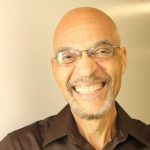Maxim Elramsisy | California Black Media
California has started administering updated COVID-19 booster shots after the Centers for Disease Control and Prevention (CDC) approved the use of new versions of boosters of the vaccine for people aged 12 and older.
The Western State Scientific Safety Review Workgroup independently reviewed the boosters and recommended that they be given to people who have already received primary vaccinations, regardless of the booster status.
The updated boosters will be “bivalent,” offering protection against the original coronavirus strains, as well as improved immunity to the currently dominant BA.4 and BA.5 strains, also known as the Omicron variants.
The Pfizer/BioNTech bivalent booster is available for people 12 years and older, while the Moderna bivalent booster is approved for those 18 years and older. The bivalent boosters have not been authorized for children under the age of 12.
“We are getting closer to an analogy with the flu vaccines,” Dr. Gil Chavez, Senior Medical Officer, Office of the State Epidemiologist, California Department of Public Health, said during a recent ethnic media sponsored COVID-19 panel discussion with other medical doctors and public health officials: Dr. Maggie Park, County Public Health Officer, San Joaquin County Public Health Services; Dr. Oliver Brooks, Chief Medical Officer, Watts Healthcare; and Dr. Eva Smith, Medical Director, K’ima:w Medical Center.
According to Chavez, “Whereas you know every year we have to get an influenza vaccine to ensure that we get the updated vaccine … with COVID-19, we are moving in the same direction where we believe that it will be important to have at least an annual booster.”
“The goal, and our hope, is to continue on a path of a low number of cases and prevent a surge in COVID cases this winter. That is why public health officials urge individuals to get the updated booster,” Chavez said.
Officials reiterate that, though boosters will prevent disease for some people, they are critically important to prevent people who contract COVID from getting seriously ill, to the point where they may be hospitalized and potentially die.
The vaccines are also an important tool for preventing “long COVID,” where symptoms such as headaches, brain fog, and fatigue can be prolonged for more than six months.
In July, a surge in infections driven by the highly transmissible BA.5 subvariant almost pushed Los Angeles County, for example, to reinstitute a universal indoor mask mandate.
“BA.5 has been the predominant circulating variant since July and is still and now accounts for about 87% of all newly diagnosed cases of COVID, with BA.4 pretty much accounting for the rest,” said Park. “I want to say that the rollout of this new booster is actually quite timely, as many models are predicting that we’re facing another COVID-19 surge this fall or winter and we need to be ready.”
While scientists believe many people infected in the most recent COVID surge will have natural immunity for some time, this type of protection begins to wane after around 90 days. So, even people who have had COVID in the past should consider getting a booster around 3 months after being infected.
In California, vaccine hesitancy persists. Seventy-two percent of all people have received primary vaccinations, but only 58.8% of people eligible for boosters have received a booster.
This is worrisome because, according to Dr. Brooks, “unvaccinated people [account for] 2.4 times more cases, 4.6 times more hospitalizations, eight times more deaths.”
Brooks shared a concept to combat vaccine hesitancy by responding to the common points of resistance in his patients, called the three C’s – complacency, confidence, and convenience.
Complacency afflicts those who think that COVID is over — or are fatigued and overwhelmed by the fact that, for the past couple of years, the virus has dominated many facets of life. Yet, it is still evolving to become more highly transmissible and more evasive of immunity from infection or vaccination. According to statistics from the Los Angeles County of Public Health, the Omicron variant killed people in all age groups at a higher rate than motor vehicle crashes.
People are concerned about the safety of the vaccines because of “misinformation that’s being perpetuated in our communities,” according to Park. “But with all the millions of doses that have been given in the United States and around the world today, we have so much information about them, and we do know that they’re safe,” she said.
Many in the community have expressed concerns that the vaccine was created too fast to be safe and reliable,” Brooks said, “The mRNA platform… that’s been around for 11 years or so; it was developed when we had SARS CoV-1 so a lot of people forget because it didn’t go pandemic and then MERS, which was Middle Eastern Respiratory Syndrome, which similar, so we use that mRNA platform.”
Many people are also contending that the shots don’t work, as they are still getting infected. Park said, “People say[ing] ‘My friend is fully vaccinated and boosted but she’s still got COVID,’ and to that, I say yes, but is she still alive? And yes, of course, she is. We never promised that the vaccinations would mean you wouldn’t get COVID… What we know is that your chance of getting COVID decreases with vaccines, but the decrease is even greater when it comes to your chance of being hospitalized or dying.”
As for convenience, vaccines are now available at locations across the state with relative ease of access and at no charge. There are no anticipated supply constraints. So, there are no groups that are being given priority. Those seeking vaccines or boosters can book an appointment at Myturn.ca.gov.











